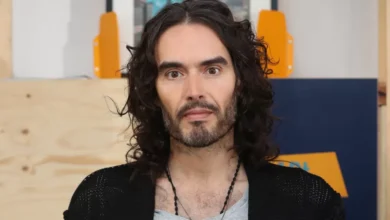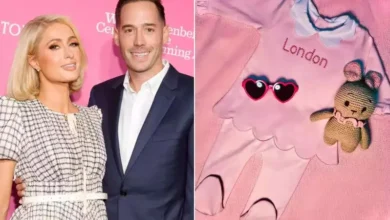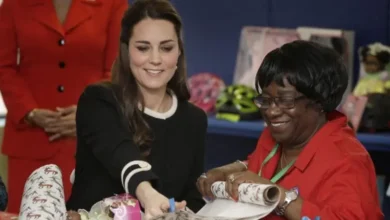Why the new Amanda Knox TV drama is misguided
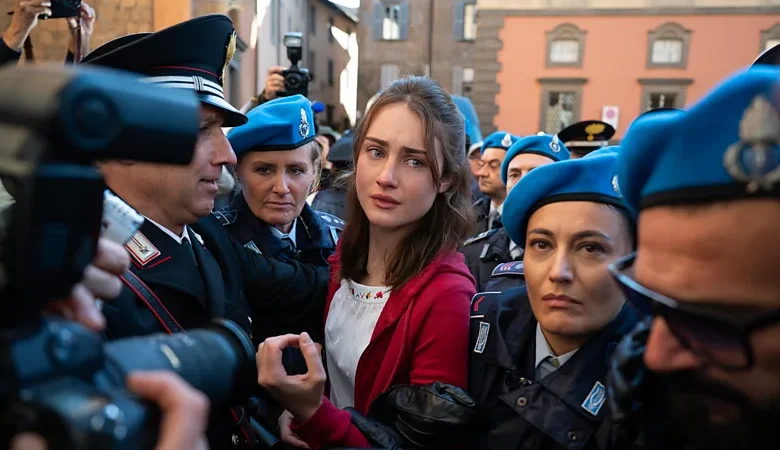
Miniseries The Twisted Tale of Amanda Knox dramatises the famous miscarriage of justice, which saw her convicted – then acquitted – of the murder of fellow student Meredith Kercher.
Last year, 17 years after 21-year-old British student, Meredith Kercher, was murdered in Perugia, Italy, an eight-part TV dramatisation about the case was announced. Kercher’s sister, Stephanie, told The Guardian as filming got underway: “Our family has been through so much and it is difficult to understand how this serves any purpose.” With the series, The Twisted Tale of Amanda Knox, beginning on Hulu in the US and Disney+ internationally today, many viewers will likely be wondering the same thing.
The answer is that the series has been driven by Amanda Knox, Kercher’s American flatmate, who – along with Knox’s boyfriend at the time, Raffaele Sollecito, and local drifter Rudy Guede – was initially convicted of the 2007 murder of Kercher. After Knox spent almost four years in jail for a crime she maintained she was innocent of, she and Sollecito had their conviction quashed and were freed in 2011, but were convicted again in a retrial in 2014, before finally being acquitted by Italy’s Supreme Court in 2015. Meanwhile Guede served 13 years of a 16-year sentence, and was released from prison in 2021.
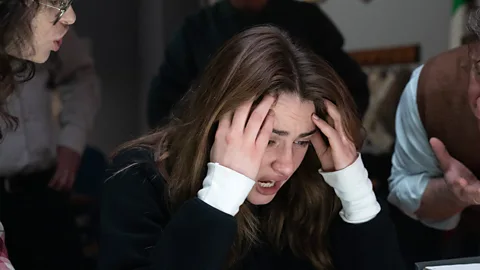
Knox experienced a terrible miscarriage of justice – the Supreme Court ruled the investigation had had “stunning flaws” while the European Court of Human Rights ordered Italy to pay her €18,400 (£16,000; $21,500) in 2019, finding faults with how the police originally interrogated her. She also suffered a trial by media: alongside the lead Italian prosecutor on the case, Giuliano Mignini, they cast her as a sexual deviant – “Foxy Knoxy”, as the tabloids delighted in calling her – who, the prosecuting case initially argued, orchestrated the killing of Kercher with the two men as part of a satanic-ritual inspired orgy that went badly wrong.
Ultimately, Knox and Sollecito were exonerated, in large part because DNA evidence linking them to the scene was also found to be flawed.
The show’s challenges – and problems
Knox has since been very vocal about her experiences in Italy, and the hate and ridicule she suffered globally since her wrongful conviction. Her first book, Waiting to Be Heard: A Memoir, was released in 2013, and she followed it up in March this year with Free: My Search For Meaning. A 2016 Netflix documentary, Amanda Knox, further examined Knox’s ordeal, featuring extensive interviews with her about her treatment. The Twisted Tale of Amanda Knox again highlights what she suffered. However, two memoirs, one documentary and several podcasts (one called Hard Knox) on, it’s difficult to understand what it really hopes to achieve.
Tonally, the drama – the work of showrunner KJ Steinberg, a producer on the likes of This is Us and Gossip Girl – is inconsistent. Knox (played committedly by Grace Van Patten) is presented in a jarringly light and jokey manner as a quirky student, larking around in hammy scenes with Kercher, and then making inappropriate, blackly humorous comments on unfolding events during the investigation and trial.
At times, the story feels overly romanticised. It even tries to emulate the film Amélie – the film which Knox and Sollecito (Giuseppe De Domenico) said they watched on the night of Kercher’s murder – with colourful vignettes and magical realism: see the scene in which a gang of teddy bears applauds Knox performing as a clown as a child. Indeed, Steinberg told The Seattle Times: “The homage to Amélie was a great way to have the audience be introduced to Amanda, the person, before she became defined in the public imagination as the warped version.” Clichés abound too – from voices fading in and out during a scene of a witness being interrogated in a police interview room, to a clunkily metaphorical moment showing a bird trapped inside, unable to escape.

Another grating element is the way the story is overlaid by the kind of irreverent millennial narration, from Van Patten as Knox, which recalls other recent true-crime dramatisations such as Inventing Anna or Apple Cider Vinegar. In trying to ape the style of these other “lighter” shows, it takes away from the severity of the actual case in hand.
The wave of ‘reclaiming’ narratives
However, after the gross injustice of being framed for a murder you didn’t commit, it’s understandable why Knox would want to put the story straight once more – and “reclaim” her narrative. This is something which a host of pop culture documentaries, podcasts and dramatisations have purportedly helped famous women to do over the past decade, casting a new light on ’90s female celebrities and figures like Britney Spears, Pamela Anderson, Monica Lewinsky and Tonya Harding, who were caught up in scandals that saw them demonised in a public forum.
Even in the short tribute to Kercher at the end of the series, Knox is once again the main focus
Interestingly, Lewinsky is an executive producer on The Twisted Tale of Amanda Knox, alongside Knox herself, having co-produced Ryan Murphy’s 2021 miniseries Impeachment: American Crime Story, which retold the story of her affair with the then US President Bill Clinton from her perspective. Some of these projects, like the Lewinsky drama, have been done with the involvement of their subjects, and some, like Hulu’s Pam and Tommy, about Pamela Anderson’s sex tape scandal, have been done without. However as Jessica Bennett asked in The New York Times of this whole sub-genre of “reclaiming the narrative” productions: “It is no secret that humans love consuming spectacle – and we doubly love a spectacle when it involves women and sex. But at what point does the fictional depiction of that spectacle, and our viewing of it, become just as bad as watching it in the first place?”
Knox has said that the series is intended to highlight that the real killer was Guede, which is valid point – given that Guede was given a “fast track” trial and convicted for the murder out of the public eye, without being subjected to the same intense media scrutiny as Knox. She recently told Newsweek: “No one cares about this guy who actually murdered my roommate. I think that is so indicative of what was going on at the time, and has always been going on with this case, [which] is the idea that it wasn’t ever even really about Meredith… The truth of what happened to her, and the truth of the person who actually did it, got completely lost for the sake of a scandalous story.”
However, the dramatisation is misguided. This sad story has two victims, but by centring Knox’s experiences, it sidelines and marginalises Kercher’s death, upsetting the delicate balance of a case where one victim never lived to tell her own story. The final two self-indulgent episodes highlight this. Much time is spent on overblown scenes seeing Knox coming face-to-face with her prosecutor Mignini (Francesco Acquaroli) in a church in Italy and confronting him about his dogged belief that she committed the crime. Surprisingly, this meet-up really did take place in Perugia in 2022. In the series, melodramatically, Mignini ends up crying, and saying to the heavens above: “God sees we both suffer.”
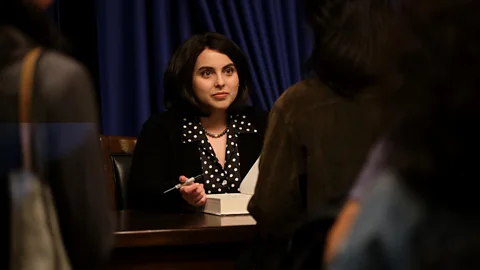 Tina Thorpe/ FX
Tina Thorpe/ FXEven in the short tribute to Kercher at the end of the series – a home video-esque montage of a smiling Kercher (played by Rhianne Barreto), laughing and mucking about in Italy – Knox is once again the main focus. She says in a voiceover: “It was fate that Meredith was home that night and I wasn’t. I was the lucky one”, continuing: “I hate that I have to dig through a decade of my trauma just to reach memories of her. I never really had the chance to mourn her… I’m coming back. I’m mourning the both of us.”
It’s arguable that the fact that Kercher’s sister – speaking on behalf of the family – wanted nothing to do with this production should have led Knox, Lewinsky and the others involved in the creation of the show to question the project, and whether it came at the expense of the other wronged female victim.
Speaking to The New York Times in 2022, Lewinsky said candidly that she would have preferred that the dramatisation of her interactions with Clinton didn’t exist at all. “I hope it’s the last time,” she said, of the retelling of her story. However as she explained in 2021 to the same newspaper, if a TV series was going to happen – and if it wasn’t the Ryan Murphy series, it eventually would be somebody else – she wanted to be in the room, to have some small sense of control. “It’s much better to be going through this as part of something,” she said, “than to be desperately trying to find out what’s on the show”. This agency, though, was not something that Kercher’s family have had.
Looking back on the events in Italy almost two decades ago, Knox recently told The Guardian that “Meredith became the footnote of a story where I was the central figure.” Unfortunately, Knox’s series has fallen foul of the same problem.
